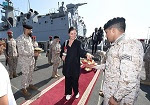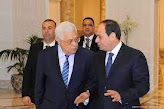According to a The Jerusalem Post report, the Egyptian military
has secured large areas of the strategic stretch of land bordering
Palestinian-run Gaza and Israel on one side and the Suez Canal on the other.
It
is no longer on the back foot, witnesses, security sources and analysts say. Civilian
life is still severely curtailed but the long-neglected region is changing as
the state forges ahead with development schemes.
Many of the militants have been killed, fled or surrendered.
Around 200 are still active, down from 400 two years ago and 800 in 2017,
according to three Egyptian security sources.
On the outskirts of North Sinai's main city Al Arish, near
where razed olive farms once stood, the government has built new apartment
blocks.
A resident said people just sought a return to normality.
"We've had enough," said the man in his 50s,
declining to be named. "We want to return to our houses or even the new
ones they are building. We want to live in peace again."
Unrest roiled northern Sinai following the uprising in Egypt
against Hosni Mubarak in 2011, escalating after the army overthrew President
Mohamed Mursi.
In November 2017, the Islamic State-affiliated militant
group Sinai Province claimed the most lethal attack in Egypt's modern history,
which killed more than 300 people at a North Sinai mosque, as well as an
assassination attempt against the defense and interior ministers at Al Arish
military airport.
The military started an operation in response in February
2018 and now appears to be in its strongest position in North Sinai - the only
area in Egypt where there is regular militant activity - for at least a decade.
The security presence in southern Sinai, a popular tourist
destination, has also been reinforced and some international travel warnings
scaled back.
At Sinai's northeastern point at Rafah and along the border
with Gaza, a buffer zone has been created on cleared land, monitored by dozens
of Egyptian watchtowers.
In its most recent statement on North Sinai, the Egyptian
military said 89 suspected militants had been killed in an undefined period
over recent months, against eight casualties from its own ranks.
There has been a "continuous and significant
decline" in the number of attacks over the past three to four years, with
approximately 17 recorded shooting attacks and 39 bomb attacks so far this year
compared to 166 and 187 respectively in 2017, security analyst Oded Berkowitz
said.
Sinai Province's capability has also been eroded by the
squeezing of supply lines and recruitment from Gaza due in part to
deteriorating relations with Palestinian factions there, and the hostility from
Sinai residents, Berkowitz said.
Though, estimating militant numbers is hard, recent death
notices suggest those still active are mostly Egyptian and Palestinians from
Gaza, while previously they included foreign fighters from the Caucuses and
Saudi Arabia, he said.
Near Bir al-Abd, where militants occupied a group of
villages for weeks in the summer of 2020, masked gunmen stormed a café where
Salem al-Sayed was watching football in September, kidnapping him and seven
others and accusing them of cooperating with the military.
"They put us in a closed place so we could not hear
anything, not even the sound of the wind," the 35-year-old told Reuters.
After four days with their hands bound and blindfolded, they were freed by the
military in a raid, Sayed said.
President Abdel Fattah al-Sisi, who as Army Chief ousted
Mursi in 2013, says developing Sinai is a priority.
"We will not leave any land that can be developed in
Sinai until we make it grow," he said this month at an event to mark the
1973 war with Israel on the peninsula.
Last month in northwestern Sinai, Sisi inaugurated a US$1.3
billion agricultural wastewater plant to help reclaim land for farming.
The government recently announced a plan for 17 agricultural
and residential development clusters across Sinai, 10 of them in the north. It
says it is allocating modern and traditional homes for those displaced.
Access and international cooperation development remain
limited, however. Demolitions and other restrictions linked to military operations
have triggered complaints from some residents and rights groups.
State infrastructure projects and housing developments seem
beyond local needs and means, said Ahmed Salem of the London-based Sinai
Foundation for Human Rights.
The effective siege in north-eastern Sinai has restricted
much economic activity, he said.
"They (both sides) destroyed Al Arish, which used to be
one of the most beautiful tourist places in Egypt. Nowhere else you could see
such sandy beaches," said one middle-aged resident.
"We don't support Islamic State, but many Sinai
residents, from Rafah to Al Arish, were dealt with unjustly and paid a heavy
price after doing nothing wrong," he said.






















